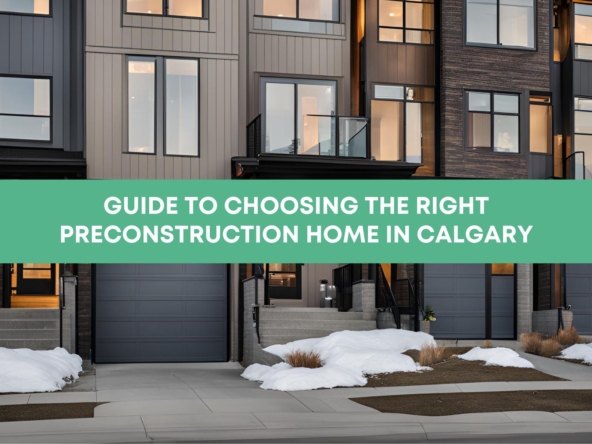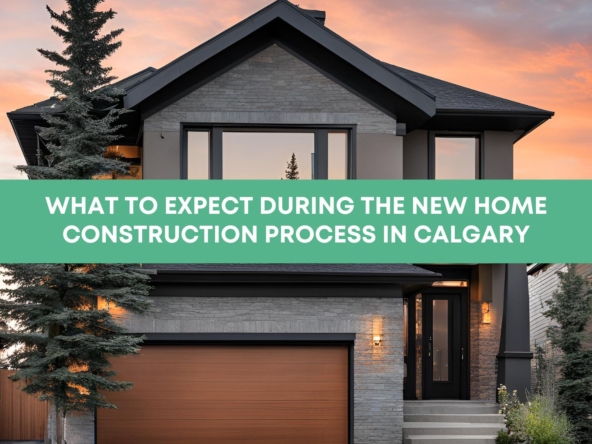Considering buying a new build home in Calgary, Alberta, Canada? It’s an exciting decision, but it’s essential to weigh the advantages and disadvantages before making the leap. In this guide, we’ll explore the pros and cons of buying a new construction home, helping you make an informed choice that suits your needs.
New build homes offer unique benefits, including customization options that allow you to tailor your home to your preferences. They also often feature energy-efficient materials, saving you money on utilities in the long run. However, it’s important to consider the potential drawbacks, such as longer completion timelines and higher costs.
By the end of this guide, you’ll have a clearer understanding of whether a new build home is the right option for you in Calgary. Let’s dive in!
Key Takeaways:
- Customization options are a significant advantage of new build homes.
- New construction homes are often built with energy-efficient materials.
- Longer completion timelines and higher costs are potential drawbacks of new build homes.
- Consider your personal preferences and financial situation when deciding between a new build home and an existing property.
- Thoroughly evaluate the reputation of the builder and any additional costs involved in the purchase of a new build home.
Pros of New Construction Homes

When it comes to purchasing a new home, there are numerous advantages to consider. New build homes offer a range of benefits that make them an appealing choice for buyers. Whether you’re a first-time homebuyer or looking to upgrade, here are some key advantages of investing in a newly built home:
- Brand New Everything: One of the most significant advantages of new build homes is that everything is brand new. From the foundation to the fixtures, you won’t have to worry about costly repairs or maintenance for a while. This means you can move in with peace of mind and focus on settling into your new home.
- Customization Options: Many new construction homes offer customization options, allowing you to personalize your living space according to your preferences. You can choose the paint colors, flooring materials, kitchen cabinets, and more. This level of customization ensures that your home reflects your unique style and taste.
- Energy Efficiency: New build homes are often built with energy-efficient materials and modern construction techniques. This results in better insulation, higher-quality windows, and efficient heating and cooling systems. As a result, you can enjoy lower energy costs over time, reducing your environmental impact and saving money on utility bills.
- Financial Incentives: Some builders offer financial incentives to attract buyers. These incentives may include discounted prices, special financing options, or upgrades at no extra cost. Taking advantage of these incentives can make new construction homes more affordable in the long run.
Investing in a newly built home provides several advantages, from the peace of mind that comes with everything being brand new to the ability to customize your living space. In addition, energy efficiency and potential financial incentives make new build homes an attractive option for buyers. By choosing a new construction home, you can enjoy the benefits of modern design, lower energy costs, and a personalized living space.
Cons of New Construction Homes
While there are many advantages to buying a new build home, it’s important to consider the potential drawbacks before making a decision. Here are some factors to keep in mind:
1. Longer Timeline for Completion
One disadvantage of purchasing a new build property is that the timeline for completion can be longer, especially if you’re involved in the design process. This may not be suitable for buyers who have a short window to move or who are eager to settle in quickly.
2. Higher Costs
New construction homes tend to come with higher costs compared to existing properties. This includes the sale price, as well as additional expenses for features that may not be included in the base purchase price. Customization options can also drive up the overall cost of the home.
3. Limited Negotiating Power
When buying a new build home, buyers may have limited negotiating power with the builder. Unlike with existing properties where negotiations can take place between the buyer and seller, builders often have set prices and terms, leaving little room for negotiation.
4. Off-gassing of Chemicals
During the construction of new build homes, certain materials and finishes may release low levels of volatile organic compounds (VOCs). These chemicals can contribute to poor indoor air quality and may have health implications. Proper ventilation and using low VOC materials can help mitigate this issue.
While these disadvantages should be considered, they don’t diminish the appeal of new build homes for many buyers. It’s essential to weigh these factors alongside the advantages before making a final decision.
Prospective Value of New Build Homes
Investing in a newly built home can offer several compelling reasons to potential buyers. One of the key factors that make new build properties an attractive investment is their potential for appreciation in value, particularly in a hot real estate market. By purchasing a new build home early in the construction process, you have the opportunity to benefit from the appreciation that occurs during the building stages. This can potentially result in a significant increase in the value of your property.
However, it’s important to consider the market conditions and the potential for future new build developments that may affect the value of your property. Thoroughly evaluating the advantages and disadvantages of new build properties can help you make an informed decision and ensure that you are making a sound investment.
Financing Options for New Build Homes
When it comes to financing a new construction home, there are different considerations compared to buying an existing property. Understanding your options and finding the right financial solution is crucial to making your dream home a reality. Whether you are purchasing a new build home from a developer or completing the build yourself, there are financing options available to suit your needs.
Mortgage for New Build Homes
If you are purchasing a new build home from a developer, obtaining a mortgage from the lender of your choice is a common financing option. With a mortgage, you’ll have the funds to purchase the home, and you can choose from different mortgage terms and interest rates.
When selecting a mortgage, it’s essential to ensure that the rate-lock period aligns with the construction timeline. This way, you can secure a favorable interest rate throughout the construction process and ensure that your financing remains stable.
Construction Loans for Self-Builds
If you own a plot of land and plan to complete the build yourself or hire a builder, a construction loan is the financing option you’ll need to explore. Unlike a traditional mortgage, a construction loan is more involved and requires interest payments throughout the construction process.
With a construction loan, you’ll borrow funds to cover the costs of construction, and the loan is typically dispersed in stages as the build progresses. This type of financing gives you the flexibility to oversee the construction of your new home while managing the financial aspects effectively.
When considering financing options for a new build home, consulting with a mortgage professional or a financial advisor can provide you with valuable insights and guidance. They can help you navigate the complexities of financing a new construction home and find a solution that best suits your needs and financial situation.
Comparing New Build Homes to Existing Properties
When deciding between a new build home and an older property, it’s essential to consider the pros and cons of each. New build homes offer the advantage of being move-in ready with modern features and customization options. On the other hand, existing properties often have more character, established communities, and larger living spaces. Energy efficiency, maintenance needs, and the potential for renovations are other factors to consider when comparing new build homes to existing properties.
| Advantages of New Build Homes | Advantages of Existing Properties |
|---|---|
|
|
While new build homes offer the advantage of being move-in ready with modern features and customization options, existing properties have their own appeal with established character, established communities, and larger living spaces. Consider factors such as energy efficiency, maintenance needs, and the potential for renovations when comparing new build homes to existing properties.
Factors to Consider When Buying a New Build Home
When purchasing a new build home, it’s essential to take several factors into consideration in order to make an informed decision. These factors include the timeline for completion, customization options, purchase price and additional costs, builder reputation and warranty, as well as any estate management charges or leasehold arrangements associated with the new build development.
Timeline for completion and availability of customization options: Before committing to a new build home, it’s important to understand the timeline for completion and whether it aligns with your moving plans. Additionally, consider the availability of customization options to personalize the home according to your preferences and needs.
Purchase price and additional costs: Thoroughly review the purchase price of the new build home and ensure that it fits within your budget. Be aware that there may be additional costs not included in the base price, such as upgrades, landscaping, or utility connections. Understanding the full financial implications will help you plan accordingly.
Builder reputation and warranty: Research the reputation of the builder before making a decision. Look for reviews and feedback from previous buyers to get an idea of their track record. Additionally, examine the warranty offered by the builder to ensure that you are protected in case of any construction or material defects.
Estate management charges or leasehold arrangements: If the new build development is part of an estate or involves leasehold arrangements, investigate any associated charges or restrictions. Understanding these factors will help you assess the long-term financial implications and potential limitations of the property.
Potential Downsides of New Build Homes
While new build homes offer several advantages, it’s important to consider potential downsides before making a buying decision. These disadvantages can affect your overall satisfaction and financial well-being in the long run. Here are some factors to keep in mind when considering a new build property:
Estate Management Charges and Leasehold Arrangements
Some new build estates may be privately managed, leading to ongoing estate management charges. These charges can be an added expense on top of your mortgage and can vary in amount depending on the development. Additionally, leasehold arrangements, commonly found in flats or apartments, can involve additional costs and restrictions imposed by the freeholder or management company.
Construction Quality and Potential Snags
When buying a new build home, it’s important to assess the quality of construction. While new builds are generally designed and built to high standards, there might be instances where the workmanship falls short. It’s crucial to thoroughly inspect the property and have a professional survey done to identify any potential issues. Additionally, the snagging process, which involves addressing minor defects or finishing touches, can sometimes be incomplete or take longer than expected.
Delays in Completion and Possible Depreciation
New build homes often come with estimated completion dates, but it’s important to be prepared for potential delays. Delays can occur due to various factors, such as unfavorable weather conditions, changes in design or materials, or unexpected construction issues. These delays can disrupt your moving plans and cause inconvenience. Furthermore, once a new build property is no longer brand new, its value may depreciate compared to other newly built properties, which could affect your investment.
| Disadvantages of New Build Homes | Drawbacks of Buying a New Build Property |
|---|---|
| 1. Estate management charges | 1. Potential ongoing costs for property maintenance and management |
| 2. Leasehold arrangements | 2. Additional costs and restrictions imposed by freeholders or management companies |
| 3. Construction quality | 3. Potential for workmanship issues and defects |
| 4. Possible snags | 4. Incomplete or extended snagging process |
| 5. Delays in completion | 5. Disruption to moving plans and timelines |
| 6. Potential depreciation | 6. Value decrease once the property is no longer brand new |
It’s crucial to weigh the potential disadvantages against the advantages when considering a new build home. Conduct thorough research, seek professional advice, and carefully evaluate various factors to make an informed decision that aligns with your lifestyle, goals, and financial situation.
Advantages of Existing Properties

When it comes to buying a home, existing properties offer several unique advantages that may sway your decision. Here are some benefits of buying an existing home:
- Established Character and Charm: Existing properties often have a unique charm and character that has developed over time. From historic architecture to stylish details, these homes can provide a sense of authenticity and history.
- Established Communities and Amenities: Many existing homes are located in established neighborhoods with well-developed amenities such as parks, schools, and shopping centers. This can provide a sense of community and convenience.
- Larger Living Spaces and Gardens: Older homes tend to have more generous room sizes and larger outdoor spaces compared to new build homes. This can give you more flexibility to design and use the space to suit your needs.
- Renovation Opportunities: Buying an existing property gives you the opportunity to renovate and personalize the space according to your preferences. This can not only create a home that reflects your style but also potentially increase its value in the long run.
Overall, existing properties can offer a unique charm, established communities, and the potential for personalization through renovations. Consider these advantages when deciding between a new build home and an existing property.
Potential Drawbacks of Existing Properties
While buying an existing property can have its benefits, it’s important to consider the potential drawbacks before making a decision. Understanding these disadvantages can help you make an informed choice that aligns with your needs and preferences.
Maintenance Needs and Upkeep
One potential drawback of older properties is the maintenance needs they may have. As properties age, they may require immediate attention and ongoing upkeep. This can include repairs, renovations, and regular maintenance tasks, such as painting or replacing outdated systems. The cost and time associated with these maintenance needs should be considered when purchasing an existing property.
Lower Energy Efficiency
Another drawback of older properties is lower energy efficiency. Older homes may not have the same level of insulation or energy-saving features as newer builds. This can result in higher monthly energy bills, as more energy is required to heat or cool the property. If energy efficiency is important to you, it’s worth considering the potential costs and environmental impact of an existing property.
Dealing with Property Chains
Buying an existing property can often involve dealing with property chains. This means that your purchase may be dependent on the sale of another property. Property chains can introduce additional delays and uncertainties into the buying process, potentially prolonging the time it takes to complete the purchase. It’s important to be aware of these potential challenges and understand the impact they may have on your timeline.
Potentially Higher Purchase Prices
Depending on market conditions, purchasing an existing property may involve higher purchase prices compared to new build homes. This can be influenced by factors such as location, demand, and the overall state of the real estate market. It’s important to thoroughly research and evaluate the market before making a decision to ensure that the purchase price aligns with your budget and expectations.
Complexities of New Build Conveyancing
Conveyancing for new build properties can be more complex compared to purchasing an existing property. When buying a new build property, there are several considerations to keep in mind to ensure a smooth conveyancing process.
Choose an Independent Solicitor
It’s crucial to select an independent solicitor who specializes in new build conveyancing. This ensures that you have someone on your side who understands the intricacies of this type of transaction. An experienced solicitor will help you navigate the complexities and protect your interests throughout the conveyancing process.
Address Contractual Aspects
When buying a new build property, it’s essential to carefully review the contract and ensure that all aspects are addressed. Pay close attention to deposit protection, completion dates, and any additional clauses or conditions. An experienced solicitor will thoroughly examine the contract and make sure your rights are protected.
Avoid Pressure from Developers
Developers may try to pressure buyers into using their recommended conveyancer. However, it’s important to remember that you have the right to choose your own independent solicitor. By doing so, you can have someone who is solely focused on your best interests and can provide unbiased advice.
Navigating the complexities of new build conveyancing is crucial to ensure a successful and stress-free transaction. By choosing an independent solicitor, addressing contractual aspects, and avoiding pressure from developers, you can navigate the challenges of buying a new build property with confidence.
Pros and Cons of Buying a New Construction Home

In conclusion, when evaluating the pros and cons of new build homes, it is important to consider various factors. New build homes offer advantages such as customization options, energy efficiency, and the potential for appreciation in value. Having the opportunity to personalize your home and benefit from energy-saving features can greatly enhance your living experience. Additionally, the potential for future value appreciation is an enticing consideration for those looking for a long-term investment.
However, it is essential to weigh these advantages against the drawbacks. New build homes often come with longer timelines and higher costs compared to existing properties. The extended construction process may not be suitable for those in need of a quick move. Moreover, the higher costs associated with new builds, including customization and additional fees, must be carefully considered when determining your budget and financial capabilities. It is crucial to thoroughly evaluate all the expenses involved in a new build home purchase to avoid any unexpected financial strain.
When making a decision between a new build home and an existing property, it is important to reflect on personal preferences, the community you desire to be a part of, the space you need, and the potential for future renovations. Careful consideration of these factors, along with the evaluation of the pros and cons, will enable you to make an informed decision that suits your unique circumstances and preferences.
FAQ
Q: What are the benefits of buying a new construction home?
A: Buying a new construction home offers several advantages, including customizable options, modern features and design, energy efficiency, and warranty coverage.
Q: What are the advantages of buying a resale home compared to a new construction home?
A: Resale homes often come with established neighborhoods, mature landscaping, and pricing that reflects market conditions, in contrast to the often higher price point of new construction homes.
Q: What are the pros and cons of purchasing a new construction home?
A: The pros of buying a new construction home include modern amenities, customizability, and resale value, while the cons may involve longer waiting periods, potential construction delays, and higher initial costs.
Q: How does buying a new construction home differ from buying an existing home?
A: Purchasing a new construction home involves selecting from pre-designed models or customizing a home from scratch, while buying an existing home offers immediate availability and a known property condition.
Q: What should I consider when choosing a home builder for a new construction?
A: When selecting a home builder for a new construction, it’s important to research their reputation, quality of work, warranty offerings, and communication style to ensure a smooth building process.
Q: What are the cons of buying a new construction home?
A: Cons of purchasing a new construction home may include the potential for construction delays, limited room for negotiation on price, and the need to visualize the final product based on floor plans and renderings.
Q: What factors should I consider when deciding between a new construction home and a resale home?
A: Consider factors such as your desired timeline, customizability, pricing, neighborhood preferences, and willingness to deal with potential renovation or updates when comparing new construction and resale homes.
Q: What are the benefits of purchasing a new-construction home over a resale home?
A: New-construction homes offer modern design, energy-efficient features, potential customization, and often come with builder warranties, providing peace of mind for homeowners.
Q: What should I know when buying a new construction home?
A: When buying a new construction home, it is important to understand the building process, timelines for completion, customization options, warranty coverage, and potential impact of construction on the surrounding area.
Q: What are the costs associated with purchasing new construction?
A: New construction costs may include the base price of the home, customization fees, lot premiums, upgrades, and closing costs, making it important for buyers to carefully budget and factor in these additional expenses.




